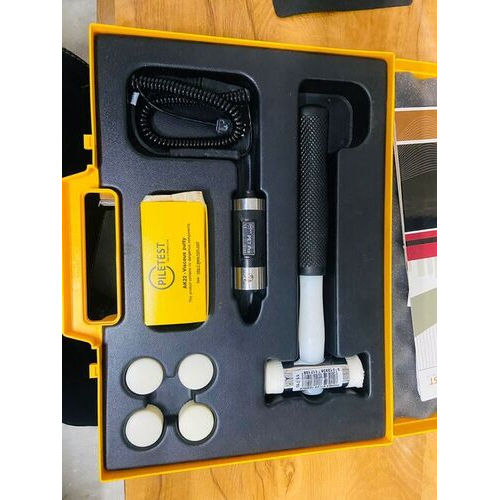Pile Integrity Testing Instruments
Price 745000.00 INR/ Unit
Pile Integrity Testing Instruments Specification
- Control Mode
- Push-button (Handheld) operation
- Phase
- Single Phase (for charger)
- Power Supply
- Battery (With AC charger included)
- Display Type
- Digital LCD Display
- Frame Type
- Handheld, Impact-resistant plastic housing
- Weight
- Approx. 1.5 kg
- Features
- Portable, Lightweight, Easy to use, High sensitivity, On-site wave signal viewing
- Capacity
- Up to 500 tests per charge
- Usage & Applications
- Pile Integrity Testing (PIT), Civil foundation analysis, Non-destructive pile testing
- Product Type
- Pile Integrity Testing Instrument
- Dimension (L*W*H)
- 225 mm x 90 mm x 45 mm
- Voltage
- DC 7.2V
- Accuracy
- High, suitable for civil engineering testing
- Power
- Rechargeable battery operated
- Frequency
- 50/60Hz (for charger)
- Color
- Blue & Black
- Automation Grade
- Semi-automatic / Manual
- Waveform Display
- Real-time on LCD
- Battery Life
- Up to 12 hours continuous use
- Sampling Rate
- Up to 100 kHz
- Sensor Type
- Piezoelectric transducer
- Test Compliance
- ASTM D5882
- Data Output
- CSV, PDF, direct print support
- Software
- Analysis & reporting software included
- Standard Accessories
- Carrying case, Charger, Cables, Instruction manual
- Communication Interface
- USB/PC connectivity
- Data Storage
- Internal memory, expandable via USB
- Calibration
- Factory calibrated and certified
- Operating Temperature
- -10°C to 50°C
Pile Integrity Testing Instruments Trade Information
- Minimum Order Quantity
- 1 Unit
- Payment Terms
- Cash Advance (CA), Cash in Advance (CID)
- Supply Ability
- 10 Units Per Month
- Delivery Time
- 3 Days
- Main Domestic Market
- , East India, Jharkhand, Assam, Sikkim, Mizoram, Meghalaya, Tripura, Uttarakhand, Manipur, Chhattisgarh, Bihar, Nagaland, Odisha, West Bengal
About Pile Integrity Testing Instruments
Product Specification
| Material | Mild Steel |
| Usage/Application | for a quick pile integrity test (PIT test) on a site with a large number of piles |
| Brand | Piletest |
| Application | Low strain integrity testing by pulse echo or transient response methods. |
| Standard | ASTM D5882-16 |
| Pile lengths | 2m to 80m |
| Sensitivity | 100mV/g |
Product Description
The PET (Pile Echo Tester) uses the Pulse-Echo method (PEM) for a quick pile integrity test (PIT test) on a site with a large number of piles.
A pile test starts when the pile top is struck with a lightweight handheld hammer. The reflected wave is captured and analyzed by the PETs digital accelerometer to provide information regarding the length and shape of the pile.
The PET is fully compliant withASTM D5882-16: Standard Test Method for Low Strain Impact Integrity Testing of Deep Foundationsand AFNOR P160-2,4 standard for pile integrity testing as well as additional standards.
The PET device (PIT tester) can connect to your MS-Windows portable PC or with the Bluetooth version to your Android smartphone or tablet.
The PET package for the PIT test includes all software versions, for PC and for Android.
High Sensitivity and Accuracy
Every test benefits from the high sensitivity of the piezoelectric transducer, ensuring precision and reliable results. The real-time LCD waveform display supports immediate on-site signal analysis, facilitating proactive engineering decisions.
User-Friendly Operation and Data Management
Push-button controls and digital LCD display make operation intuitive, while internal memory with USB expandability accommodates extensive test records. The analysis and reporting software enables seamless data processing and report generation in widely used formats.
Portable, Durable Design for Field Use
Compact and lightweight at only 1.5 kg, the instruments ergonomic shape and impact-resistant plastic housing withstand demanding field environments. The rechargeable battery supports up to 500 tests per charge, ensuring uninterrupted assessments even in remote locations.
FAQs of Pile Integrity Testing Instruments:
Q: How is the pile integrity testing instrument powered during on-site use?
A: The instrument is powered by a rechargeable DC 7.2V battery, providing up to 12 hours of continuous use, with an AC charger included for convenient recharging between tests or at job sites.Q: What types of data output formats are supported for test reports?
A: Reports can be generated and exported in CSV or PDF formats, and there is direct print support, simplifying result sharing with stakeholders and integration into project documentation.Q: What is the process for storing and transferring test data from the instrument?
A: Test data is initially stored in the devices internal memory, which can be expanded via USB. Transfer to a PC is accomplished with USB/PC connectivity, allowing easy data management and further analysis using the included software.Q: When is calibration required for this instrument, and how is it performed?
A: Each unit is factory calibrated and certified prior to shipping, ensuring immediate accuracy upon delivery. For ongoing reliability, periodic professional calibration is recommended according to usage frequency and industry standards.Q: Where can the instrument be used given its operating temperature range and design?
A: Suitable for diverse field environments, the instrument operates reliably between -10C and 50C. Its impact-resistant, portable housing makes it ideal for construction sites and challenging outdoor settings.Q: What are the primary benefits of using this pile integrity tester for civil engineering projects?
A: Engineers benefit from high-accuracy, non-destructive testing that complies with ASTM D5882. The instruments portability, large memory, and advanced reporting streamline foundation assessments and promote timely, data-driven decisions.Q: How does the instrument comply with international testing standards?
A: The device is specifically designed to meet ASTM D5882 standards for pile integrity testing, ensuring its suitability and acceptance in civil engineering projects both locally and for export.

Price:
- 50
- 100
- 200
- 250
- 500
- 1000+
 English
English Spanish
Spanish French
French German
German Italian
Italian Chinese (Simplified)
Chinese (Simplified) Japanese
Japanese Korean
Korean Arabic
Arabic Portuguese
Portuguese
 Send Inquiry
Send Inquiry

